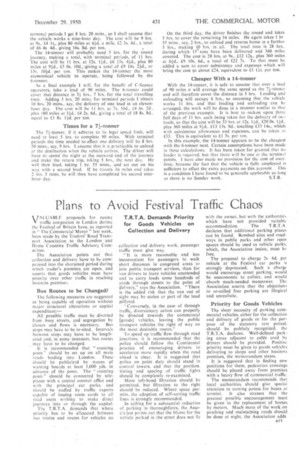Plans to Avoid Festival Traffic Chaos
Page 49

If you've noticed an error in this article please click here to report it so we can fix it.
T.R.T.A. Demands Priority for Goods Vehicles on Collection and Delivery VALUABLE proposals for casing traffic congestion in London during the Festival of Britain have, as reported in The Commercial Motor" last week, been made by the Traders' Road Transport Association to the London and Home Counties Traffic Advisory CornnUttee.
The Association points out that collection and delivery have to be compressed into the shortened period during which trader's premises are open. and asserts that goods vehicles must have priority over other traffic in reaching business premises.
Bus Routes to be Changed?
The following measures are suggested as being capable of operation without major structural alterations or capital expenditure:—
Alt possible traffic must be diverted from busy streets, and segregation by classes and flows is necessary. Bus stops may have to be re-sited. Intervals between stops may have to be lengthened and, in some instances, bus routes may have to be changed.
It is recommended that " routeing posts' should be set up on all main roads leading into London. These should be publicized by means pf warning boards at least 1,000 yds. in advance of the posts. The " routeing posts" should be connected by telephone with a central control office and with the principal car parks. and should be staffed by traffic experts capable of issuing route cards to all road users wishing to make direct journeys into or through the capital.
The T.R.T.A. demands that where priority has to be allocated between bus routes and routes for vehicles on collection and delivery work, passenger traffic must give way.
"it is more reasonable and less inconvenient for passengers to walk short distances in congested areas to join public transport services, than for van drivers to leave vehicles unattended and to carry loads some hundreds of yards through streets to the point of delivery," says the Association. "There is the added risk that the van out of sight may he stolen or part of the load pilfered.
Conversely, in the case of through traffic, diversionary action can properly be directed towards the commercial [goods] vehicles, leaving the public transport vehicles the right of way on the most desirable routes."
To speed up traffic flow through road junctions, it is recommended that the police should follow the Continental practice of encouraging drivers to accelerate more rapidly when the road ahead is clear. It is suggested that police on point duty should stand in control towers, and that the position. timing and spacing of traffic lights should be completely re-examined.
More left-hand filtration should be permitted, but filtration to the right should he reduced. Where space permits, the adoption of self-sorting traffic lines is strongly recommended.
In calling for a substantial reduction of parking in. thoroughfares, the Associa:ion points out that the blame for the vehicle parked in the street does not lie with the owner, but with the authorities which have not provided suitable accommodation. The T.R.T.A declares that additional parking places can be found. Bombed sites and roadways in public parks and other open spaces should be used as vehicle parks. which, the Association insists, must be free.
The proposal to charge 2s 6d. per vehicle at the Festival car parks is strongly deprecated. Such a charge would encourage street parking, would be uneconomic to collect, and would • absorb much-needed manpower. The Association asserts that the objection; to so-called free parking are illogical and unrealistic.
Priority for Goods Vehicles
The sheer necessity of parking commercial vehicles, either for the collection and delivery of goods or for the purpose of the Statutory rest period. should be publicly recognized. the T.R.T.A. declares. Well-defined parking areas adjacent to cafes used by drivers should be provided. Positive priority must be given to goods vehicles delivering to shops and other business premises, the memorandum states.
it is suggested that in finding new positions for them, pedestrian crossings should be placed away from premises with a heavy flow of commercial traffic.
The memorandum recommends that local authorities should give special attention to turning points for buses at termini. It also stresses that the greatest possible encouragement must be given to the replacement of horses by motors. Much more of the work.on patching and maintaining roads should be done at night. the Association adds




















































































